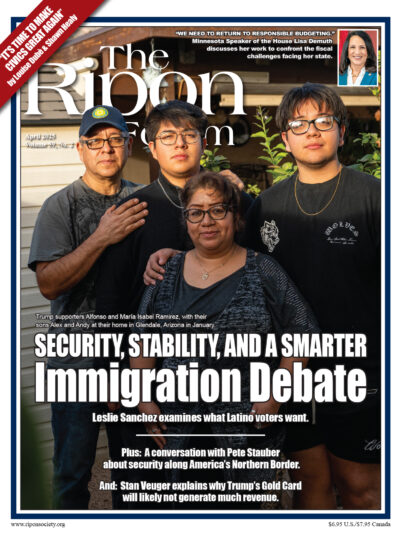
President Donald Trump’s executive order seeking to repeal birthright citizenship—the guarantee of U.S. citizenship to anyone born within the country’s borders—would overturn long-standing legal precedent. It would also directly contradict the language of the 14th Amendment, which unequivocally states, “All persons born or naturalized in the United States and subject to the jurisdiction thereof, are citizens of the United States and of the State wherein they reside.”
And, importantly, the executive order would contravene its stated purpose of addressing illegal immigration—and in fact would swell the existing unauthorized population, not only today but for the generations ahead, as new U.S.-born residents deprived of the ability to gain U.S. citizenship would automatically join the unauthorized rolls. This creation of a self-perpetuating class of U.S. residents excluded from full membership in the society would undoubtedly create untold problems for the country, not least weakening social cohesion.
Already, multiple district and appellate courts have enjoined the executive order’s implementation. One Reagan-appointed federal judge, in blocking the order, remarked, “I’ve been on the bench for over four decades. I can’t remember another case where the question presented was as clear as this one is.” However, the Trump Administration and other opponents of birthright citizenship continue to claim that the phrase “subject to the jurisdiction thereof” leaves room for interpretation, particularly regarding the children of undocumented immigrants or those with temporary visas. However, a long line of legal scholars from across the political spectrum strongly disagrees, asserting that historical debates surrounding the 14th Amendment, as well as prior common law, clearly establish birthright citizenship as a fundamental principle of American law.
This essay argues that repealing birthright citizenship would be unconstitutional, counter to American values, economically harmful, and create an administrative nightmare.
Birthright Citizenship and Founding American Values
Birthright citizenship is deeply rooted in the founding principles of the United States. The U.S. was established in rejection of monarchy and hereditary privilege, embracing the idea that each person is born equal and should not bear the burdens or legal status of their parents. To repeal birthright citizenship would be a sharp departure from this principle, creating a system in which children inherit the legal disadvantages of their parents, directly contradicting the notion of equality before the law.
The 14th Amendment was ratified in the aftermath of the Civil War specifically to ensure that citizenship could not be denied based on ancestry or race. The attempt to undermine this constitutional provision echoes historical efforts to exclude certain racial and ethnic groups from full participation in American society. Repealing birthright citizenship would thus represent a regressive shift in policy, rejecting a key foundation of the nation’s commitment to equality and inclusion.
Creation of a Multigenerational Underclass
One of the most troubling consequences of repealing birthright citizenship would be the creation of a stateless underclass within U.S. borders. Ironically, rather than decreasing illegal immigration, this policy would increase the size of the nation’s undocumented population. Children born in the United States to non-citizen parents would be rendered stateless, unable to obtain work authorization, education, or healthcare, and subject to exclusion from society.
One of the most troubling consequences of repealing birthright citizenship would be the creation of a stateless underclass within U.S. borders.
The impact would be devastating, as these individuals—despite being born and raised in the United States—would have no legal standing or pathway to citizenship. Over time, this generational transmission of lack of status would create a caste of people denied full participation in society, exacerbating inequality and leading to greater economic and social instability.
An Engine of Successful Integration
The National Academy of Sciences, in a widely respected review of the literature, found that the United States has historically excelled at integrating immigrants: an achievement that I would argue that owes in significant part to birthright citizenship. Unlike many other nations with high levels of immigration, the U.S. has seen significant intergenerational success in immigrant integration.
Studies consistently show that legal status is a key determinant of educational achievement, language proficiency, employment opportunities, and upward mobility. By granting full citizenship to the U.S.-born children of immigrants, birthright citizenship ensures that each generation has the opportunity to fully participate in and contribute to society. Removing this right would hinder the integration of millions of individuals, ultimately weakening the social fabric of the nation.
The Economic Costs of Repeal
At a time when the U.S. faces an aging population and declining birth rates, immigration has been a critical driver of labor force growth. The Congressional Budget Office has found that immigration contributes to GDP growth and helps curb inflation by increasing the labor supply. Repealing birthright citizenship would diminish these economic benefits by reducing the number of young, educated, and legally authorized workers entering the labor force at their full potential.
The vast majority of immigrants come in search of economic opportunity, safety, and a better future. The economic contributions of immigrants and their U.S.-born children, who are projected to account for virtually all labor force growth for the next decades, far outweigh the costs associated with granting birthright citizenship, making repeal an economically short-sighted decision.
The Costs of Exclusion
Repealing birthright citizenship would disproportionately harm Latino and Asian American populations, who constitute the largest groups of immigrants in the U.S. The removal of automatic citizenship for the U.S.-born children born to undocumented immigrants would perpetuate cycles of disadvantage, making it even more difficult for these communities to achieve socioeconomic equality and for their members to bring their full talents to the U.S. economy and society.
Moreover, limiting citizenship based on parental status would create administrative and legal nightmares for federal, state, and local agencies, leading to inconsistent application of the law. This would further marginalize already vulnerable populations, deepening racial and ethnic divisions in American society.
The Administrative Burden of Repeal
Beyond the ethical and legal concerns, repealing birthright citizenship would impose an immense administrative burden. The current system provides a straightforward, easily verifiable rule: birth within U.S. territory equals citizenship. If this rule were repealed, the government would be required to verify the legal status of every newborn’s parents—a process that would be costly, prone to errors, and lead to further legal disputes.
If this rule were repealed, the government would be required to verify the legal status of every newborn’s parents—a process that would be costly, prone to errors, and lead to further legal disputes.
Historical precedent shows that bureaucratic errors in immigration enforcement often result in wrongful denials of legal status. A policy requiring proof of parental citizenship or legal status would have disproportionate impacts on lower-income and minority populations, who may lack access to the necessary documentation. This would create an inconsistent and discriminatory system that would erode public trust in government institutions.
A “Cure” That Is Worse than the Problem
Although critics argue that birthright citizenship encourages “birth tourism,” there is little evidence to support the claim that people immigrate to the U.S. primarily to obtain citizenship for their children. And the number of U.S. births to foreign-born women who do not reside in the U.S. is negligible . There are other means short of eradicating constitutional protections to tackle birth tourism, including through visa and air carrier policies.
The attempt to repeal birthright citizenship is a legally unsound and morally indefensible endeavor that contradicts American values, would create an underclass of stateless individuals, burden government bureaucracy, and undermine the economic prosperity of the nation. The 14th Amendment’s guarantee of birthright citizenship is a cornerstone of American democracy, ensuring equal rights for all individuals born on U.S. soil.
To dismantle this fundamental principle would be a grave mistake. Birthright citizenship has long served as a pillar of integration and national cohesion. Upholding it is essential to preserving the country’s commitment to economic strength, the rule of law, and equality.
Michael Fix is a Senior Fellow and former President of The Migration Policy Institute.




